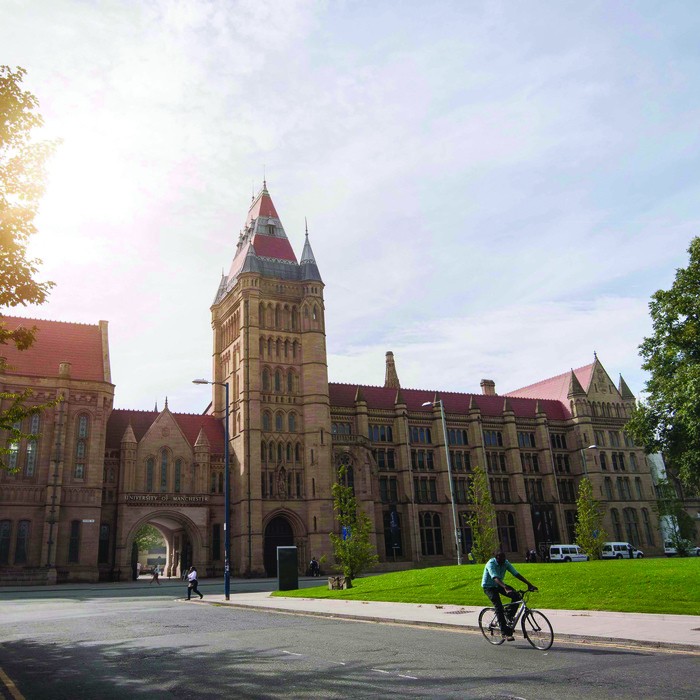University of Manchester teams win seven Royal Society of Chemistry prizes
Three individuals and four teams from The University of Manchester have won prestigious prizes from the Royal Society of Chemistry, celebrating the most exciting chemical science taking place today.
The Royal Society of Chemistry’s prizes have recognised excellence in the chemical sciences for more than 150 years. In 2019, the organisation announced the biggest overhaul of this portfolio in its history, designed to better reflect modern science.
Of those to have won a Royal Society of Chemistry Prize, over 50 have gone on to win Nobel Prizes for their pioneering work.
The Manchester recipients have been awarded for research themes ranging from diagnosing Parkinson’s disease and molecular magnetism, to developing new biocatalysts for pharmaceuticals.
The University of Manchester award winners:
- The Nose-to-Diagnose Team of Universities of Manchester and Edinburgh, with collaborators in the Netherlands and in Industry, have been named the winner of the Royal Society of Chemistry’s new Analytical Division Horizon Prize: Robert Boyle Prize for Analytical Science.
- The Molecular Magnetism Group from The University of Manchester has been named the winner of the Royal Society of Chemistry’s new Dalton Division Horizon Prize.
- The CrystalGrower team – an international team led by scientists from the University of Manchester, has been named the winner of the Royal Society of Chemistry’s new Materials Chemistry Division Horizon Prize.
- The Biocatalyst Discovery team – also known as the Redam Detectives – has been named the winner of Chemistry Biology Interface Division Horizon Prize: Rita and John Cornforth Award.
- The teams become four of the first winners of the Royal Society of Chemistry’s new Horizon Prizes, introduced after the organisation carried out a wholesale review of its recognition portfolio to better reflect modern science and its impacts in making the world a better place.
- Dr Jiangnan Li is the winner of the Royal Society of Chemistry’s Dalton Emerging Researcher Award.
- Dr Nicholas Chilton is the winner of the Royal Society of Chemistry’s Harrison-Meldola Memorial Prize.
- Dr Helen Ryder is the winner of the Royal Society of Chemistry’s Award for Exceptional Service.
The Horizon Prizes celebrate the most exciting, contemporary chemical science at the cutting edge of research and innovation. These prizes are for teams or collaborations who are opening up new directions and possibilities in their field, through ground-breaking scientific developments. The teams receive a trophy and a professionally produced multimedia pack showcasing the prize-winning work and its importance.
We’re delighted that the team is being recognised and not just individual group leaders. It is a great initiative of the Royal Society of Chemistry to bring in a prize that recognises our culture that brings together team members with different skills to address interdisciplinary challenges.
The Horizon Prizes celebrate the most exciting, contemporary chemical science at the cutting edge of research and innovation. These prizes are for teams or collaborations who are opening up new directions and possibilities in their field, through ground-breaking scientific developments. The teams receive a trophy and a professionally produced multimedia pack showcasing the prize-winning work and its importance.
The Research and Innovation Prizes – of which the Dalton Emerging Researcher Award and the Harrison-Meldola Memorial Prize are two – celebrate brilliant individuals across industry and academia. They include prizes for those at different career stages in general chemistry and for those working in specific fields, as well as interdisciplinary prizes and prizes for those in specific roles.
The Volunteer Recognition Prizes – of which the Award for Exceptional Service is one – celebrate those who give their time freely in numerous ways, from serving on boards and committees to working on public engagement initiatives. The prizes celebrate teams and individuals at all stages of their career.
After receiving the prize, Professor Perdita Barran, Chair of Mass Spectrometry and Director of the Michael Barber Centre for Collaborative Mass Spectrometry, The University of Manchester, said: “We say we are led by the nose and we are, although all of this has been a route to exploring sebum which has been tremendously exciting because we believe sebum traps compounds. From the smell of new-born babies to the scent of second-hand clothes, we all have a knowledge that sebum has a smell or can trap smells, but Joy was the person who made us realise that this could be useful. When you think of it like that – you wonder why no one thought of it before.”
The team receiving the prize for contributions to molecular magnetism, was led by Professor Richard Winpenny, Synthesis and Measurement, EPSRC Established Career Fellow, The University of Manchester.
After receiving the prize, he said: “We’re delighted that the team is being recognised and not just individual group leaders. It is a great initiative of the Royal Society of Chemistry to bring in a prize that recognises our culture that brings together team members with different skills to address interdisciplinary challenges.”
Dr Ryder, Chair of the Royal Society of Chemistry's Formulation Science and Technology Interest Group (FSTG), won the prize for outstanding service to the Royal Society of Chemistry.
On receiving the prize, Dr Ryder said: “What an honour! I am extremely proud to accept this Award for Exceptional Service from the RSC. To be recognised for the voluntary work I do as Chair of the Formulation Science and Technology Interest Group and as Interest Group Representative for the Member Networks Committee is truly amazing. There are so many fantastic volunteers working to advance the chemical sciences so to be nominated and awarded this prestigious award is beyond anything I thought possible. Truly, truly grateful.”



